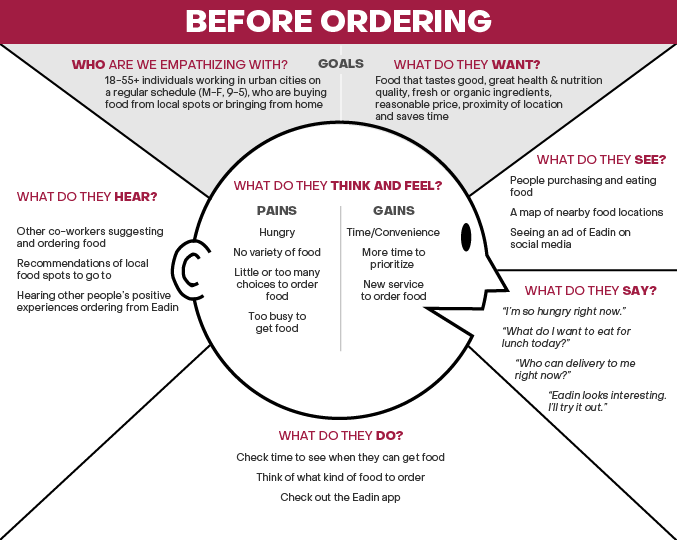Eadin: Empowering Creative Professionals Through Smart Food Delivery
UX DESIGNER & RESEARCHER | “BEST UX AND SERVICE DESIGN” AWARD
How might we empower creative professionals to build sustainable businesses while serving an underserved market?
Chefs were trapped in exploitative restaurant jobs ($34,559/year average) with no creative autonomy, while urban professionals struggled with limited, unpersonalized lunch options.
-
I led user research through surveys (48 respondents), chef interviews, and competitive analysis to understand both sides of our marketplace. Key findings revealed that 64% of professionals wanted customized meals and 92% were interested in chef-quality food regularly, while chefs desired entrepreneurial opportunities but lacked business experience and direct customer connections. Both groups craved personal relationships rather than transactional experiences.
-
We designed a platform connecting professional chefs with busy workers through smart locker delivery. For chefs, this meant creative freedom to design menus and schedules, direct customer relationships through integrated chat, business training support, and a fair 75/25 revenue split. For diners, we provided AI-powered chef matching based on flavor profiles, convenient temperature-controlled lockers in office buildings, and restaurant-quality food with personal connection to the chefs creating their meals.
-
Three core decisions shaped the user experience: a swipe-to-match interface that made chef selection feel personal rather than transactional, creating emotional investment in chef relationships; an integrated chat system that enabled direct communication for dietary needs and preference learning, allowing chefs to build genuine relationships with regular customers; and a smart locker network that solved delivery logistics while maintaining food quality, eliminating delivery uncertainty and enabling flexible pickup times.
-
The project received academic recognition as "Best UX and Service Design" by peers and faculty, with projected business impact of $64.7M profit by Year 3 supporting 1,503 chefs. Most importantly, our design would increase chef income by 77% over traditional restaurant work, reaching $61,063 annually while providing the creative autonomy and direct customer relationships they desired.
-
Technology can empower creative professionals rather than replace them. The key insight: creative professionals deserve tools that respect their expertise while handling business complexity.
This project taught me how to design for multi-sided marketplaces, balance stakeholder needs, and create systems that scale while maintaining human connection.





